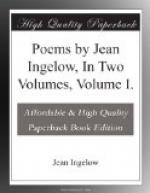There was a Poet, Madam, once (said he);
I will relate his story to you now.
While through the branches of this apple-tree
Some spots of sunshine flicker on your
brow;
While every flower hath on its breast a bee,
And every bird in stirring doth endow
The grass with falling blooms that smoothly glide,
As ships drop down a river with the tide.
For telling of his tale no fitter place
Then this old orchard, sloping to the
west;
Through its pink dome of blossom I can trace
Some overlying azure; for the rest,
These flowery branches round us interlace;
The ground is hollowed like a mossy nest:
Who talks of fame while the religious Spring
Offers the incense of her blossoming?
There was a Poet, Madam, once (said he),
Who, while he walked at sundown in a lane,
Took to his heart the hope that destiny
Had singled him this guerdon to obtain,
That by the power of his sweet minstrelsy
Some hearts for truth and goodness he
should gain.
And charm some grovellers to uplift their eyes
And suddenly wax conscious of the skies.
“Master, good e’en to ye!” a woodman
said,
Who the low hedge was trimming with his
shears.
“This hour is fine”—the Poet
bowed his head.
“More fine,” he thought, “O
friend! to me appears
The sunset than to you; finer the spread
Of orange lustre through these azure spheres,
Where little clouds lie still, like flocks of sheep,
Or vessels sailing in God’s other deep.
“O finer far! What work so high as mine,
Interpreter betwixt the world and man,
Nature’s ungathered pearls to set and shrine,
The mystery she wraps her in to scan;
Her unsyllabic voices to combine,
And serve her with such love as poets
can;
With mortal words, her chant of praise to bind,
Then die, and leave the poem to mankind?
“O fair, O fine, O lot to be desired!
Early and late my heart appeals to me,
And says, ’O work, O will—Thou man,
be fired
To earn this lot,’—she
says, ’I would not be
A worker for mine OWN bread, or one hired
For mine OWN profit. O, I would be
free
To work for others; love so earned of them
Should be my wages and my diadem.
“‘Then when I died I should not fall,’
says she,
’Like dropping flowers that no man
noticeth,
But like a great branch of some stately tree
Rent in a tempest, and flung down to death,
Thick with green leafage—so that piteously
Each passer by that ruin shuddereth,
And saith, The gap this branch hath left is wide;
The loss thereof can never be supplied.’”
But, Madam, while the Poet pondered so,
Toward the leafy hedge he turned his eye,
And saw two slender branches that did grow,
And from it rising spring and flourish
high:
Their tops were twined together fast, and, lo,
Their shadow crossed the path as he went
by—
The shadow of a wild rose and a brier,
And it was shaped in semblance like a lyre.




